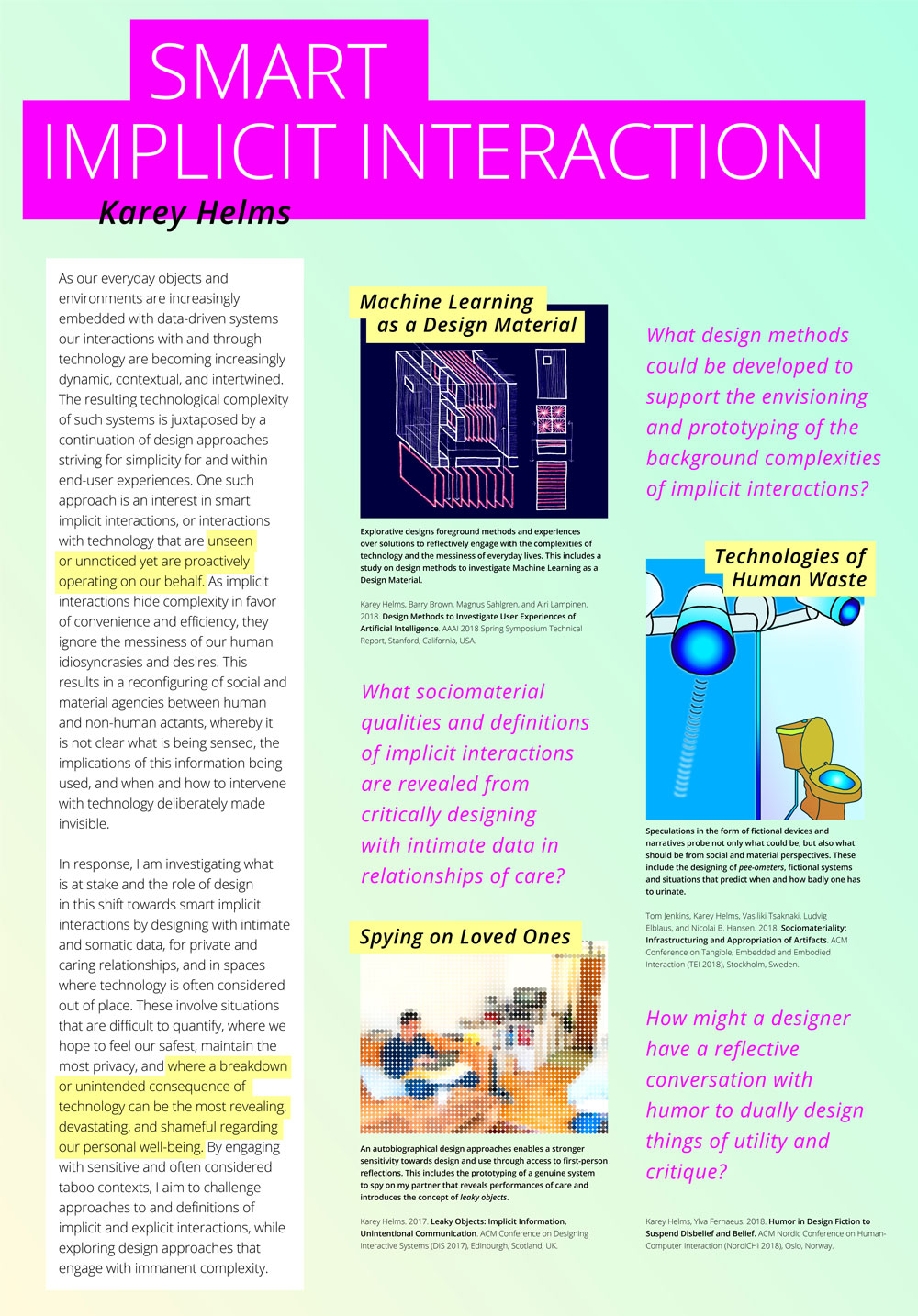Today was our department’s annual PhD Supervisory Panel at KTH during which PhD students are given the opportunity to get feedback from senior researchers who act as “guest supervisors.” To prepare for my meeting with two Associate Professors I reworked my research abstract and research questions following my 30% seminar in October, during which Johan Redström from Umeå Institute of Design acted as my discussant. My goals in today’s supervisory panel were to get feedback on the new scope of my abstract and research questions relative to being only about 40% through my PhD (and I’m sure will continue to evolve), and identify important areas that I need to work on articulating to more firmly position my research in the context of how I am conceptually “furnishing” my design space. Considering I was presenting to senior researchers from different academic backgrounds than my own and each other, it was especially helpful to see within which aspect I felt misunderstood, i.e. where I need to sharpen my arguments. Below my poster summarizing my research thus far, followed by a few notes/reflections based on feedback received today, and a textual version of my abstract and research questions.

Reflections
• The three research questions are too big in scope, each could be the basis of a single PhD. Damn it.
• The second research question appears to be my primary one, and thus if the others are also important, I need to map where and how other than as a formal RQ. For example, a primary reflection I had was regarding my use of and intent with humor being primarily important regarding my aesthetic axioms as a designer. I need to work on articulating this in relation to my values and methods.
• Need to sharpen my abstract and broader argument on how I am defining and engaging with concepts such as sociomateriality and a reconfiguring of agency
Abstract
As our everyday objects and environments are increasingly embedded with data-driven systems our interactions with and through technology are becoming increasingly dynamic, contextual, and intertwined. The resulting technological complexity of such systems is juxtaposed by a continuation of design approaches striving for simplicity for and within end-user experiences. One such approach is an interest in smart implicit interactions, or interactions with technology that are unseen or unnoticed yet are proactively operating on our behalf. As implicit interactions hide complexity in favor of convenience and efficiency, they ignore the messiness of our human idiosyncrasies and desires. This results in a reconfiguring of social and material agencies, whereby it is not clear what is being sensed, the implications of this information being used, and when and how to intervene with technology deliberately made invisible.
In response, I am investigating what is at stake and the role of design in this shift towards smart implicit interactions by designing with intimate and somatic data, for private and caring relationships, and in spaces where technology is often considered out of place. These involve situations that are difficult to quantify, where we hope to feel our safest, maintain the most privacy, and where a breakdown or unintended consequence of technology can be the most revealing, devastating, and shameful regarding our personal well-being. By engaging with sensitive and often considered taboo contexts, I aim to challenge approaches to and definitions of implicit and explicit interactions, while exploring design approaches that engage with immanent complexity.
My Research through Design approach includes speculative, autobiographical, and explorative design methods. Speculations in the form of fictional devices and narratives probe not only what could be, but also what should be from social and material perspectives. These include the designing of fictional systems and situations that predict when and how badly one has to urinate. An autobiographical design approaches enables a stronger sensitivity towards design and use through access to first-person reflections. This includes the prototyping of a genuine system to spy on my partner that reveals performances of care. Explorative designs foreground methods and experiences over solutions to make sense of and reflectively engage with the complexities technology and the messiness of our everyday lives. This includes a study on design methods to investigate Machine Learning as a Design Material. I also employ an overt use of humor in design to simultaneously invite others into my design space while making sure provocations are not confused with proposals.
Research Questions
• What sociomaterial qualities and definitions of implicit interactions are revealed from critically designing with intimate data in relationships of care?
• What design methods could be developed to support the envisioning and prototyping of the background complexities of implicit interactions?
• How might a designer have a reflective conversation with humor to dually design things of utility and critique?